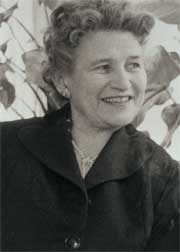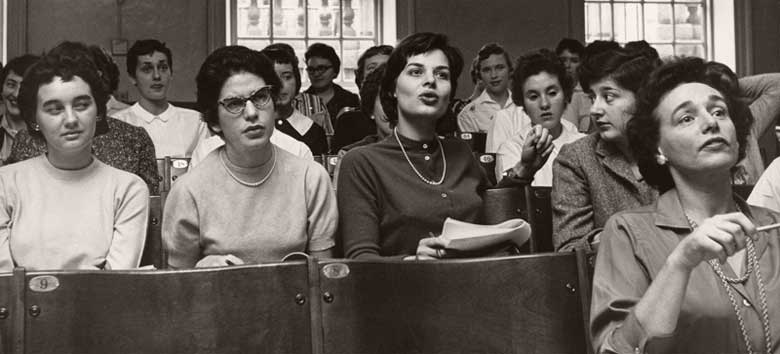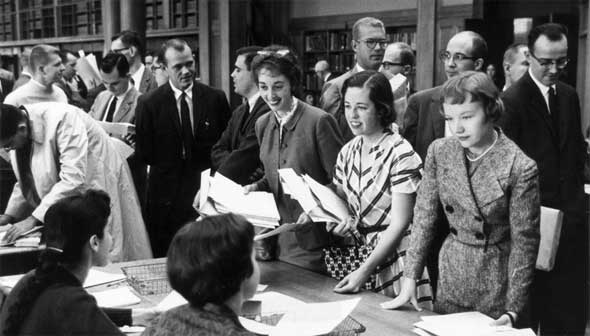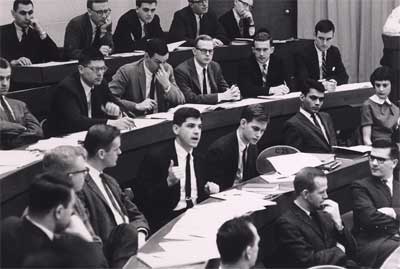

Dean Teele, a man of efficient bearing and high confidence, sums up–“Those who study the role of women to take responsible roles in business administration. We know that a growing number of companies in business and industry are making available better jobs for women every year, and we expect the trend to continue at an accelerated pace.” HRPBA Records Wall Street Journal: HBS plans to open its doors to women, May 13, 1959
In 1956, Radcliffe’s business education certificate program underwent a third and final change and emerged as the Harvard-Radcliffe Program in Business Administration (HRPBA), with a more broad-based curriculum that explored the challenges facing business and its administration. As a press release issued by the university explained, the merger, “was undertaken to meet more effectively the growing demand for women in administrative positions.”7 Within a couple of years, graduates of the program would be offered the opportunity of applying for the second year of the MBA degree at Harvard Business School.
From 1956 to 1963, the Harvard-Radcliffe Program in Business Administration followed a curriculum that was similar to the MBA program at Harvard Business School. Classes included marketing, production, administration, finance, economics, “control” (accounting and statistics), and the famous Written Analysis of Cases course. However, the six-week fieldwork experience requirement continued for HRPBA students. In a 1959 vote, HBS faculty made several significant decisions: to open the Doctor of Business Administration (DBA) program to women candidates, to allow HRPBA graduates to apply for a second-year MBA degree, and to admit women into the Executive Education Program for Management Development (PMD). With this vote, Harvard Business School took key steps to experiment further with degree-earning business education for women.
Between 1959 and 1962, the HRPBA continued as a one-year certificate program, while across the river twenty-three of its graduates applied to HBS and enrolled as second-year MBA candidates. It was often a difficult transition, made with both excitement and frustration. Some missed the camaraderie of the Radcliffe program. Betty Diener, HRPBA ’63, MBA’64, DBA ’74 reflected that the Radcliffe Program had given the students a “voice” if they had gone only to HBS, she said, “we never would have spoken up, we never would have been recognized for our ideas, and we never would have gained that sort of self confidence.”8
 A philanthropist and activist for workers rights, Margaret E. Smith was the greatest private supporter of the Harvard-Radcliffe Program in Business Administration, making more contributions to the program than any other person or organization. She also served on the faculty. Portrait of Margaret Earhart Smith, ca. 1955.
A philanthropist and activist for workers rights, Margaret E. Smith was the greatest private supporter of the Harvard-Radcliffe Program in Business Administration, making more contributions to the program than any other person or organization. She also served on the faculty. Portrait of Margaret Earhart Smith, ca. 1955.
"This one year course has changed our lives and our attitudes—our attitudes toward ourselves and toward the world and our place in it."
In this film, produced by the Harvard-Radcliffe Program in Business Administration, Radcliffe College documents the likely experiences of new program students through the eyes of one potential candidate, Nancy Reinert. The film records Nancy's introduction to the HRPBA program from a meeting with the program director to the classroom experience to an informal group discussion of a case study. The project also details the social life of a student, including dormitory life, homework, and a conversation over dinner about marriage. The film concludes with the admissions committee reviewing the candidate strengths and weaknesses and Nancy learning of her acceptance into the program.
There’s been a problem. You need a newer version of the Macromedia Flash plug-in to play this video. If you install the Flash plug-in and view this page again, you will be able to play this video.
- 7
- University News Office Press Release, February 4, 1954. Harvard-Radcliffe Program in Business Administration Records (Arch E73.10B), HBS Archives, Baker Library Historical Collections, Harvard Business School. ←
- 8
- Betty J. Diener, interview by Livingston Grant, transcribed tape recording, March 27, 2000, Harvard-Radcliffe Program in Business Administration Oral History Project, Schlesinger Library, Radcliffe Institute, Harvard University. ←
- Baker Library | Historical Collections | Site Credits
- Contact Email: histcollref@hbs.edu


